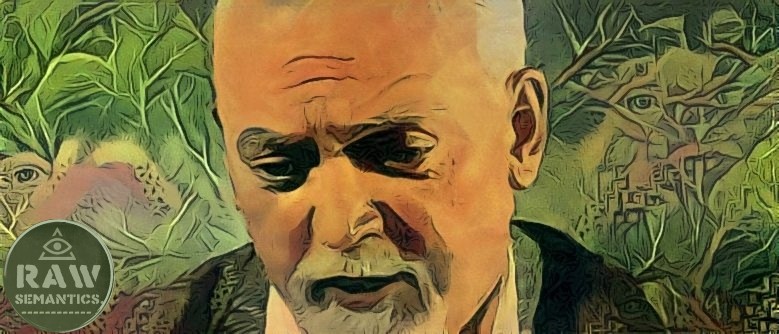On Philosophical Style, by Brand Blanshard (1954), is a short book that asks why much “respectable” philosophy seems difficult to read. Here’s an example of what Blanshard has in mind (from Kant’s Critique):
‘But because a certain form of sensuous intuition exists in the mind a priori which rests on the receptivity of the representative faculty (sensibility), the understanding, as a spontaneity, is able to determine the internal sense by means of the diversity of given representations, conformably to the synthetical unity of apperception…’
Blanshard lists several writing habits and tendencies that, for him, make for “bad” (ie unnecessarily unintelligible) philosophical style. I doubt you’ll be surprised when I say that I think Robert Anton Wilson’s philosophical writings appear to rate well against Brand’s criteria for “good” style.
A common problem, according to Blanshard: “excessive generality of statement”. Our minds are so constituted, he argues, that we have to think by means of tangible examples. He contrasts Kant’s style (of deliberately abstaining from illustrations) with that of Charles Sanders Peirce, who “links clarity and concreteness so intimately that he virtually reduces one to the other”.
Blanshard notes that in converting from the specific to the generic, a writer effectively translates from Anglo-Saxon to Latin, which an old prejudice holds to be more “dignified” in mood:
‘Of course many writers have never thought of asking whether their writing is predominantly Roman or Saxon. It might pay them to do so. Raleigh thought that “imperfect acquaintance with the Latin element in English is the cause of much diffuse writing and mixed metaphor. If you talk nonsense in Saxon you are found out at once… But put it into Latin and the nonsense masquerades as profundity of abstract thought.” ‘
– Brand Blanshard, On Philosophical Style
RAW has commented on this in a different context (a chapter in his book, Quantum Psychology):
‘Some say “fuck” “is” “dirty” and “sexual intercourse” isn’t because “fuck” comes from the Anglo-Saxon and “sexual intercourse” comes from the Latin. But then we must ask: how did Anglo-Saxon get to be “dirty” and why does Latin remain “clean”?’
– RAW, ‘How George Carlin Made Legal History’, Quantum Psychology
But getting back to the over-generalising tendency in philosophy – not only did RAW seem very careful to avoid abstractions-without-examples (what Wendell Johnson referred to as “dead-level abstracting”), he also of course wrote at length about the dangers of this tendency (usually from a General Semantics perspective).
Bob also seemed no fan of abstract nouns or repetition. So too with Blanshard, who writes that philosophers often seem abusers of these – but not as bad as sociologists! To make his point he quotes from a sociology textbook (abstract nouns, incidentally, commonly end in “-tion”):
‘Social and political organizations tend to become accommodated to the spatial distribution or ecological organization resulting from the prevailing forms of transportation. The introduction of new forms of communication such as the railway, automobile, telegraph, radio, necessitates a reaccommodation of social organization to the new interpretation of spatial distance.’
– quoted in Brand Blanshard’s ‘On Philosophical Style’
(A lot of abstract nouns there, plus some repetition – eg of the word “organization”).
Ornate wording, over-embellishment
‘Use no superfluous word, no adjective, which does not reveal something.’
– Ezra Pound
‘Style is the feather in the arrow, not the feather in the cap.’
– George Sampson, Seven Essays
Blanshard says that although he has a “weakness” for colourful poetic and emotional rhetoric, he feels sure “this is not the way to write philosophy”. He cites George Santayana as the “most distinguished recent exemplar” of imaginative prose in philosophy, but adds that his style “is not, as philosophic style should be, so transparent a medium that one looks straight through it at the object, forgetting that it is there; it is too much like a window of stained glass which, because of its very richness, diverts attention to itself.”
In Schrödinger’s Cat Trilogy (The Universe Next Door), RAW describes how Blake Williams faced a turning point in 1977 on reading “a book entitled Cosmic Trigger”. RAW continues – referring to himself in the novel, in apparently self-deprecating manner: “The author, a rather too clever fellow named Robert Anton Wilson, who wrote in a style as opulent as a Moslem palace…”. (My bold)
Elsewhere, Bob said it was his habit to do multiple re-writes, alternatively stoned and unstoned, until he felt happy with the writing from both perspectives. I suspect that process would, if anything, tend to remove “superfluous” elements, particularly on difficult philosophical areas prone to misinterpretation. Here’s a passage that I’ve selected pretty much at random from Quantum Psychology, and which I think nicely captures an element of RAW’s unique style on such tricky topics:
‘We can then say the Hidden Variables did it, and we don’t have to say the act of measurement did it — or the report of the act of measurement did it, as in the Wigner argument. “Common sense” and maybe even Aristotelian logic can arise again from the graves to which physics consigned them in the 1920s.
‘Unfortunately, two major objections exist to the Hidden Variable model. In the first place, Hidden Variable theories “sound wrong” and even smell wrong to modern scientists. They suggest Aristotelian “essences” and even Platonic “deep realities” and other metaphysical entities, or spooks. They even remind some scholars of the alleged “hidden essence of Jesus” which Catholics claim lies buried within something that appears only a piece of bread to our senses and instruments. In short, they have a distinctly medieval stench about them.’
– Robert Anton Wilson, Quantum Psychology
Garage philosopher / VIP scientific philosopher
 I’m not sure who coined the term “garage philosophy”, but Erik Davis uses it to refer to the philosophical output of both Robert Anton Wilson and Philip K. Dick. I appreciate the term – it conjures up a rough-hewn DIY approach to styling one’s own concepts (I assume “garage philosopher” is used in a kind of ironic way, like the “lowbrow” pop-surrealism art movement), but I think it probably better describes many of those who appreciate and write about Robert Anton Wilson than it captures RAW himself. Erik has also referred to RAW as a “hands-on occult philosopher”, which contrasts with (and possibly also complements) Tim Leary’s description of Bob W. as “One of the most important scientific philosophers of this century”.
I’m not sure who coined the term “garage philosophy”, but Erik Davis uses it to refer to the philosophical output of both Robert Anton Wilson and Philip K. Dick. I appreciate the term – it conjures up a rough-hewn DIY approach to styling one’s own concepts (I assume “garage philosopher” is used in a kind of ironic way, like the “lowbrow” pop-surrealism art movement), but I think it probably better describes many of those who appreciate and write about Robert Anton Wilson than it captures RAW himself. Erik has also referred to RAW as a “hands-on occult philosopher”, which contrasts with (and possibly also complements) Tim Leary’s description of Bob W. as “One of the most important scientific philosophers of this century”.
Incidentally, RAW’s careful, subtle and precisely-worded (but often misunderstood) takes on scientific philosophy remind me of radical philosopher Richard Rorty’s recommendation that we stop regarding science as a quasi-priesthood of “rationality” or “objectivity”, but rather as an effective social model for reaching agreements in a free and open mode of inquiry:
‘On this view there is no reason to praise scientists for being more “objective” or “logical” or “methodical” or “devoted to truth” than other people. But there is plenty of reason to praise the institutions they have developed and within which they work, and to use these as models for the rest of culture. For these institutions give concreteness and detail to the idea of “unforced agreement”.’
– Richard Rorty, ‘Science as Solidarity’, in Objectivity, Relativism and Truth (1991)
Anti-metaphysical
(Appended 25/1/2021*): I would bracket RAW with anti-metaphysical philosophers (eg Wittgenstein, Rorty, etc). By anti-metaphysical, I mean arguing against making claims about what things really are (as opposed to how we see them).
But I don’t mean anti-metaphysical in the sense of anti-“spiritual”. In fact, you could argue that unlike most scientific philosophers, RAW’s output has a strong salvific (or “soteriological”) aspect – an implicit (and sometimes very explicit) purpose of alleviating suffering and/or triggering “awakening”.
In that respect, his approach sometimes looks more like Eastern philosophy, with its nondual enlightenment traditions. By contrast, modern western philosophy, with a focus more on seeking ‘truth’ as a specialised academic pursuit, has tended not to have goals of liberation – that’s been left to monks, weirdos and meditation retreats. RAW seemed far ahead of the game on this (and that’s before we even get to the techno-futurism and extropian trajectories).
For me, the anti-metaphysical and salvific aspects come together in sublime ways in RAW’s semantics (both in his use of, and in his writings about, language).
* From my static ‘Robert Anton Wilson‘ page

Thanks for this. RAW’s style evolved and changed depending on the occasion but always his own individual voice. And he always struck the right balance between direct, to the point, and whimsical.
LikeLike
Thanks, Lizzie. yeah, I very much agree with that.
LikeLike
Tom Jackson at RAWIllumination.net has kindly posted a mention and link to my post here. I hadn’t read the Rorty Wiki, and it doesn’t shed too much light for me about Rorty’s philosophy, although I found it interesting on biographical details. Rorty himself can be a “difficult” writer to comprehend, although he’s also written fairly accessible material (I will hopefully write more about him on areas where I think his views converge with RAW’s). On the ‘garage philsopher’ label, I probably should have added “myself included” when I wrote “many of those who appreciate and write about Robert Anton Wilson”, as I’m very far from being any kind of academic writer!
Also on Rorty/RAW, I posted a couple of tweets a couple of weeks ago, with links to comments by RMJon23/Overweening Generalist:
LikeLike